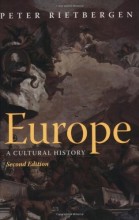Summary: Europe : A Cultural History | 9780415323598 | Peter Rietbergen
- This + 400k other summaries
- A unique study and practice tool
- Never study anything twice again
- Get the grades you hope for
- 100% sure, 100% understanding
Read the summary and the most important questions on Europe : a cultural history | 9780415323598 | Peter Rietbergen.
-
1 Before 'Europe': towards an agricultural and sedentary society
This is a preview. There are 1 more flashcards available for chapter 1
Show more cards here -
1.1 The 'birth of Europe' and the Greek 'world view', or how to define one's own culture
This is a preview. There are 21 more flashcards available for chapter 1.1
Show more cards here -
What kind of term was 'Europe' first, and where and when did it came into use first?
Kind: geographicalWhere: GreeceWhen: 7th century BC -
How do most culture's define civilization (normality and identity)?
By describing certain peripheral areas and their inhabitants as not conforming to their own norms, branding them as foreign and even uncivilized; this enables people to define what is their 'own' and what is 'others'. -
What reflects that the Greeks found Asia civilized but politically and military unsound?
It reflects Greek fear of their most powerful neighbors. -
Why was Europe a strong civilization in the 7th century?
Because it was concentrated in free, independent and democratic city-states which between them maintained a balance of power. -
What did the Greek states share and what not?
They shared:- language (Greek)- religious and cultural traditions (Hellas)They did not share:- a political structure- specific geographical entity=> a cultural community of independent states -
How did the Greek civilization celebrate it's cohesion (example)?
1. The games held every fourth year near the great temple of Zeus at Olympia in the Peloponnese.2. The pilgrimages made to the famous Pythia, the oracle at the sanctuary of Delphi, with sumptuous monuments and statues presented by cities and private citizens alike. -
Where was the name 'Europe' coined?
In a mythical story about the rape of the maiden Europa, a Phoenician princess, who was abducted by the father of the gods, Zeus, and taken to Crete. -
Did the Greeks recognize and even honour their many cultural debts to the Near East, to Asia?
- The story about the rape of the maiden Europa, a Phoenician princess, who was abducted by Zeus and taken to Greece seems to symbolize this.- Herodotus also mentioned that the alphabet had been a Phoenician invention.- Plato wrote admiringly about the religious and philosophical ideas of Egypt.- The Acropolis would not have been built but for Greek knowledge of the great Persian palaces -
What was the prime cause for how the Greek civilization has been shaped and why it was different?
The climat: very varied> made people flexible and active, both physically and mentally. -
In what context did the linguistic distinction between Greek and non-Greek gradually acquire political content?
Persian pressure being noticeably felt by the Greek, emphasizing the difference between 'Greek freedom'and 'oriental despotism'.
- Higher grades + faster learning
- Never study anything twice
- 100% sure, 100% understanding
Topics related to Summary: Europe : A Cultural History
-
A new society: from humanism to the enlightenment - The world of Alexander the Great
-
Europe's revolutions: freedom and consumption for all? - Between the Alps and the Mediterrannean, between the Estruscan and the Greek worlds: the expansion of the early Romans
-
Europe's revolutions: freedom and consumption for all? - From an informal to a formal empire
-
Europe's revolutions: freedom and consumption for all? - Rome, the second century AD: a legal system, a legal society- the Roman contribution























![English vocabulary in use : advanced ; [100 units of vocabulary reference and practice self-study and classroom use] Book cover image](https://app.studysmart.ai/uploads_prod_data/source/ANYx220/da0fc0aec8eb9003796d685a2248d940188d4cba.jpeg)








